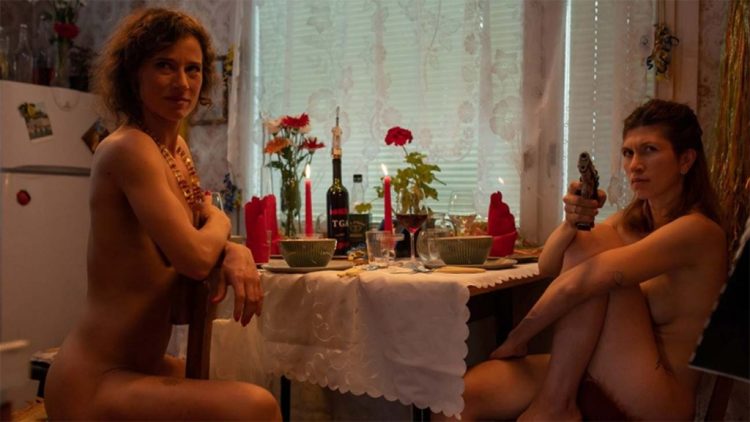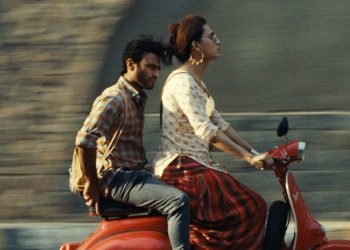Macedonian director Milcho Manchevski’s 1994 feature debut, Before the Rain, was a powerful and artfully made portrayal of the violent ethnic conflicts tearing apart his homeland. The film, which premiered in Venice, took home the Golden Lion and was nominated for an Oscar, turning Manchevski into a formidable arthouse talent overnight.
That was well over twenty years ago, and in the ensuing decades the director has never quite managed to top his first feature, completing a handful of movies that received festival play or limited releases — the best of them, 2019’s Willow, won a few awards and was picked up for distribution by Kino Lorber — but failed to generate the same overall enthusiasm.
Kaymak
The Bottom Line
Neither subtle nor sultry.
Venue: Tokyo International Film Festival (Competition)
Cast: Sara Klimoska, Kamka Tocinovski, Aleksander Mikic, Simone Spirovska, Ana Stojanovska, Filip Trajkovikj
Director-screenwriter: Milcho Manchevski
1 hour 46 minutes
His latest work, the raunchy and flamboyant dramedy Kaymak, seems destined for the same fate. Entertaining to an extent, but also over-the-top and a bit ridiculous, the film follows two Macedonian couples living in the same apartment house in the nation’s capital of Skopje.
Hailing from different social classes, the couples hardly cross paths except when they’re screaming at each other out the window. But they share something in common, which is that they’re both in the midst of midlife crises, resulting in lots of sex, a little violence and plenty of the movie’s titular food — a sweet-tasting and creamy Turkish cheese — which is purchased, consumed and even spread across naked flesh.
Manchevski clearly wanted his film to have the same light and luscious consistency, but his humor is heavy-handed and his gender politics shaky, even if female characters dominate the narrative. There are also a tad too many sexcapades that aren’t, well, very sexy, giving the movie a borderline vulgar side that lacks broad appeal. After playing in the main competition in Tokyo, it’s unlikely to travel very far.
The scenario has an upstairs/downstairs divide that’s initially intriguing, although Manchevski never takes it anywhere: In the building’s fabulous penthouse live the rich banker Eva (Kamka Tocinovski) and her layabout husband Metodi (Filip Trajkovikj), who have everything going for them except for their inability to conceive a child. They agree to hire a young relative from the countryside, Dosta (Sara Klimoska), to be the surrogate mother, but the situation turns their household upside-down when Dosta wants to play more of a role in the baby’s life than Eva is willing to give her.
Meanwhile, the cramped ground floor apartment is occupied by the working-class pair of Caramba (Aleksander Mikic) and Danche (Simona Spirovska). He’s an aging security guard at the bank where Eva works, and she toils away in a bakery. Their relationship is clearly on the fritz, but that all changes when Caramba starts having an affair with the local food vendor — and kaymak seller — Violetka (Ana Stojanovska), who gradually winds up transforming the couple into a happy, kinky threesome, if only temporarily.
The film jumps back and forth between the two trios, who seldom interact until a fatal encounter toward the end. Manchevski used a similar method in his previous work, following characters whose fates intertwine at different points in the same story, allowing him to tackle a subject — such as the Yugoslav Wars’ effect on Macedonia (now officially known as North Macedonia) in Before the Rain — from various angles.
But here the method fails to yield anything as strong as in the director’s debut, with each set of threesomes reaching wanton levels of hysteria as sexual and marital tensions boil over.
Eva’s comeuppance, after her plan to have a baby at all costs backfires on her, is both predictable and overcooked, especially when she urinates in public during a nervous breakdown. The naughty antics of the group downstairs aren’t more appealing, with Caramba soon left behind when the two women in his life fall madly in love. He eventually turns into their humiliated manservant, bringing them coffee in nothing but an apron, and giving us a little ass-shaking in the process. Seriously, who wants to see that?
Manchevski seems to be commenting on how the needs of the individual and those of the couple are forever in conflict, but his observations often stoop to the level of caricature. Applying some of the stylistic devices present in his other films — oversaturated colors, immersive handheld camerawork, lots of cross-cutting between stories — he never manages to turn Kaymak into an engaging affair. Despite all the sex, domestic drama, and at least one death by the end, the film ultimately feels anecdotal — a minor work from a director who once gave us something major.
Source by www.hollywoodreporter.com











